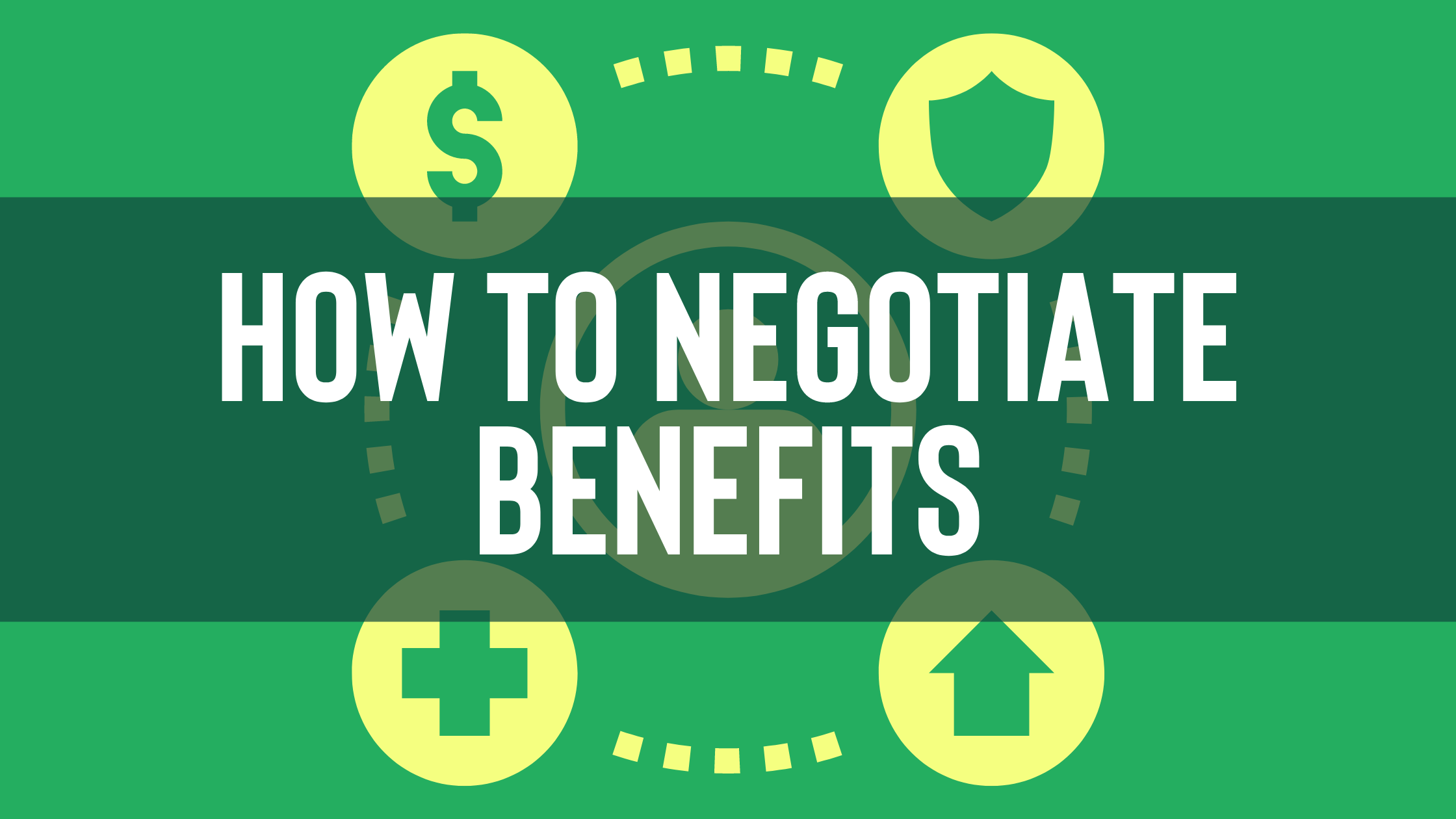

When it comes to negotiating a job offer or asking for a raise, most of us tend to focus solely on salary. We forget that our benefits are another piece in our total compensation package and when we ignore this, we’re leaving a ton of money on the table. In fact, according to the United States Bureau of Labor Statistics, benefits make up approximately 29% of total compensation costs.
No amount of pizza parties are going to make up for that.
?
Knowing which benefits are negotiable and how to approach the subject in negotiations will help you secure a compensation package that you’re happy with.
Key points:
- Negotiate your entire compensation package, not just salary.
- Negotiating doesn’t always mean getting paid more money. It could also mean gaining more work-life balance through your benefits package.
- Some benefits are legally required based on the size of the company and type of role.
- Don’t wait until the job offer phase to bring up benefits. Leverage introductory talks with recruiters and job interviews to ask about salary and benefit information.
- If a company can’t budge on salary or a specific benefit, you can get creative with your counter by bringing up other benefits to negotiate for.
What else can you negotiate besides salary?
There are 2 types of benefits a company offers to its employees: statutory benefits which are mandatory and voluntary benefits that an employer chooses to offer.
Employers are legally required to cover benefits like Medicare and Social Security, unemployment insurance, workers’ compensation insurance, health coverage, and Family and Medical Leave Act (FMLA) protections. If they don’t provide these benefits under the federal and state requirements set for each, they could be penalized. For instance, under the Affordable Care Act, employers with 50 or more full-time employees are legally required to provide health insurance or pay penalty fees to the IRS.
?
Then there are other benefits that a company may include in their benefits package to show employees their commitment to them and increase their ability to retain good talent. These are voluntarily offered by the company depending on their values and are usually negotiable depending on the company and their flexibility to offer more or less of a specific benefit.
Benefits you can typically negotiate include:
- Better health benefits
- Work flexibility like remote work, work-from-home or work-from-anywhere days, flexible hours, a 4 day work week, etc.
- A later start date
- A sign-on bonus
- Stock options
- More paid or unpaid vacation time
- More paid time off (PTO) days
- A higher matching percentage for employer-sponsored retirement plans such as 401(k)s
- Volunteer days
- Relocation assistance
- Home office stipend
- Company-paid phone plans
- Transportation reimbursement
- Performance incentives like bonuses
- Tuition reimbursement
- Learning or development stipends such as paid trainings, conference attendance, and other events
- Professional memberships
- More parental leave
- Child care assistance
- Family planning benefits
- Sabbaticals
- Wellness benefits like gym membership reimbursement and mental health resources
- Guaranteed severance packages in the event of a layoff
?
If you don’t know where to begin when negotiating benefits, ask yourself this question:
What benefits would have the biggest impact on your life, health, well-being, and work-life balance?
Negotiating for additional benefits isn’t only about increasing your overall compensation package but also about ensuring that you have the support you need to succeed in your role and maintain a healthy work-life balance. Knowing exactly what you want is going to make this process much easier.
?
When should you negotiate benefits?
You probably don’t want to go through an entire job interview process only to find out in the job offer that they don’t offer health insurance, which is a pretty important benefit. It’s a good idea to research what benefits a company offers when applying to a job. In states like Washington, there are pay transparency laws that require employers to post both the salary and benefits in the job posting. Whether they do or don’t have that information available, you’re allowed to ask them about it at any point in the interview process (it's a great question to use as an answer to the job interview question, "Do you have any questions for us?")
Similar to discussing salary expectations in the introductory interview, it’s best to ask about the benefits package upfront along with the salary range. Use this time to set expectations with the hiring manager about what you’re looking for in a total compensation package. You can even ask for any external documentation they can share that explains their benefit package.
?
When you receive the job offer, be prepared to ask for any additional benefits that aren’t in the benefit package. If you’re negotiating a higher salary, you can also ask for certain benefits you would like, especially if you're countering an lowball offer or if the company that can’t budge on salary.
How to Negotiate Benefits in a Job Offer
Remember that negotiations aren’t battles, they’re partnerships. You’re working with the hiring manager, not against them, to come to an agreement that works for the both of you. Avoid being short, cold, or too cut throat in your communication with them.
When receiving and negotiating a job offer, a good rule of thumb is to use the 24-hour rule to review the offer, so you can respond with confidence, knowing exactly what you want and how you’re going to ask for it. If they didn’t share the full compensation package with the job offer, first ask for that. This should include both the salary and benefits. Then lead with excitement and gratitude before countering with a higher salary, more benefits, or both.
Refer the script structure from our salary negotiation scripts guide to put together a response along the lines of:
“Thank you so much! I really enjoyed meeting with you, getting to know the team, and think this role is a perfect fit for me. Before accepting the offer, there are a few things I want to discuss. The salary is much lower than my market rate for this position. Based on the scope of the role, my experience, skills, and the results I’ve been able to drive in my professional career that I intend to bring to this position, I am interviewing for roles that offer a salary between [$X and $X] and [insert any benefits that are important to you]. What can we do to come to an agreement?”
?
If you’re only negotiating for additional benefits and are happy with the salary offer, use a script similar to this:
“Thank you for this opportunity and I'm excited to work with the team! Before I accept the offer, I would like to discuss the compensation package and see if we can include a few additional benefits. My experience, skills, and value I’ve been able to demonstrate in my prior roles warrants a higher compensation package. I’d be eager to accept the offer with a $10,000 sign-on bonus, an additional 5 days of PTO, and flexible hours.”
If you’ve tried to negotiate a higher salary and the company can’t budge due to budget constraints, and you really want the job, use a script like this for your counter:
“Thank you for working through the details of the offer with me. I understand the company doesn’t have the budget to go higher on the salary. However, I’d be eager to accept the offer with [state the benefits you’d like to negotiate for] included in my contract.”
Try to read the hiring manager to see if they are at their limit or not, and if you’re able to gently push for more.
How to Negotiate Benefits When Asking for a Raise or During Employee Reviews
Employee performance reviews and raise discussions have a slightly different context than negotiating during a job offer. You’ve already been at the company for quite some time and have hard evidence of the value your work brings. Lead with that!
During employee reviews, use this script as a guide to draft out your own:
“Thank you for meeting with me today. I’ve been with the company for [X] years now and love the work I do, as well as the team I work with. Together, we’ve completed a number of successful projects together that yielded results like [explain some results you’ve driven in your role]. However, in that time, the scope of the role has changed with several additional responsibilities. Before I can fully commit to those, I would like to review my compensation package and reach an agreement that better suits these new responsibilities. Considering the value I bring, in addition to industry standards, similar positions recently posted on the company’s website, my experience, skills, & market rate, I believe a salary of [$X] makes the most sense moving forward. I’m also interested in discussing more paid time off and a fully remote work arrangement.”
?
Stand Your Ground
You have every right, and the power, to negotiate for the benefits that matter most to you. After you state or send over your requests, leave it at that. Don’t add any fluff or passiveness that might show these are flexible and aren’t that much of a big deal to you. Embrace awkward silences and try not to cave under the pressure.
Most importantly, once both sides come to an agreement, make sure that any negotiated benefits, perks, and salary are in writing as a part of your contract. If they’re not in your contract, they can change and take them away at any time.
Alright, that wraps it up for this week! I’m Daniella Flores, a former software engineer turned career researcher who writes about tech, money, and different jobs. My work has been featured in TIME, CNBC, CNET, Business Insider, and Investopedia (among many others). I’m extremely passionate about workers' rights and financial freedom, so it’s a pleasure to be able to bring you this type of content through the Salary Transparent Street blog (thank you for the opportunity, Hannah!) If you want to connect, follow me on Linkedin. Chat soon!
Do you know if you're being underpaid? Take our free quiz to find out!
Need help determining your market rate? Download our free Market Research Guide to learn what you should be making.
Explore over 5,000+ individually reported salaries nationwide across all industries in our Salary Database!
Follow us on TikTok, Instagram, Facebook, YouTube and LinkedIn for daily pay transparency interviews and career news you can use!
Subscribe to our weekly newsletter for news updates, professional deep dives, learning opportunities, and more!
Send us an email ➡️ hello@salarytransparentstreet.com


